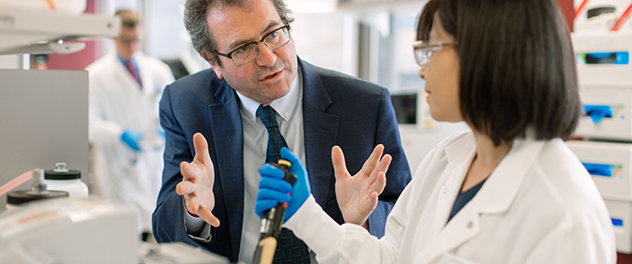 Premier institution
Premier institution
Mayo Clinic is forging a new path in diagnosis, discovering new targets for treatment, developing better therapies and finding first-time cures.
Overview
Mayo Clinic is forging a new path. As our experts continue to define the underlying autoimmune mechanisms that drive a host of neurological conditions including multiple sclerosis (MS), we are diagnosing conditions more accurately and earlier, discovering new targets for treatment, developing better therapies, and finding first-time cures.
This progress marks a turning point in the way physician-scientists confront many neurological conditions, and the Center for Multiple Sclerosis and Autoimmune Neurology at Mayo Clinic is leading the field.
The Center for Multiple Sclerosis and Autoimmune Neurology is the premier institution for research and patient care in autoimmune neurological disorders. While seeing more than 3,500 adults and children with these conditions each year, the center has made groundbreaking progress on multiple sclerosis, neuromyelitis optica, autoimmune encephalitis and other neurological conditions.
Key accomplishments
- Identifying four distinct types of MS lesions. We're now studying these differences through the MS Lesion Project, a tissue database at Mayo Clinic with samples from more than 700 participants. Understanding what causes these lesions has major therapeutic implications.
- Developing natural human antibodies that promote remyelination and neural repair, healing the loss of myelin sheath around the nerves or the nerve itself.
- Pioneering the use of plasma exchange therapy to treat acute attacks of MS and neuromyelitis optica.
- Establishing the Autoimmune Neurology Clinic in 2006, making it the first of its kind in the United States. The clinic provides state-of-the-art approaches to diagnose and treat autoimmune neurological disorders, including epilepsy, dementia and movement disorders.
- Discovering the anti-aquaporin 4 antibody, the first diagnostic biomarker for any MS-like illness. The discovery that people with neuromyelitis optica have an autoantibody that targets a water channel in astrocytes, a type of nerve cell in the brain, has changed thinking about the development of demyelinating diseases and has led to novel treatments.
- Establishing the Neuroimmunology Laboratory at Mayo Clinic to test a diverse array of neural antibodies on blood samples from more than 150,000 people.
- Discovering and classifying autoimmune epilepsy and autoimmune dementia, and developing new diagnosis and treatment approaches for both.
- Identifying the role of a unique population of immune cells involved in the damage of nerve fibers (axons) that have lost their myelin sheath and discovering the mechanisms underlying such injury. This discovery may ultimately provide a strategy for protecting axons and preserving neurological function.
Rapidly evolving science
Autoimmune neurology is a rapidly evolving subspecialty driven by the discovery that the immune system can target virtually any structure within the central or peripheral nervous systems.
These conditions manifest as disorders previously thought to be independent and unrelated. Some of these conditions are well known, such as MS, and others so rare that only a handful of people with these conditions are known to exist in the world.
While the subspecialty stretches far beyond multiple sclerosis, investigators in the Center for Multiple Sclerosis and Autoimmune Neurology apply newfound knowledge of these disorders to advance neurological research. This continuous loop of discovery and application increases our ability to treat people with a wide variety of autoimmune and demyelinating diseases, which are increasingly recognized as treatable and reversible.
Forward-facing research and education
A powerful network of research labs and a large biorepository put our investigators at the forefront of discoveries in multiple sclerosis and other neurological conditions. Our research programs and labs engage in rigorous efforts to make discoveries that improve prevention, diagnosis and treatment of neurological disorders.
Bioinformatics, advanced molecular imaging and clinical trials are at the heart of the critical infrastructure that supports clinical services to help people facing challenges from these conditions.
With a keen eye toward creating a solid foundation of research and building the way for future success, the center operates education programs that continuously groom the talents of new investigators. Awards for pilot projects, postdoctoral fellowships and career development are vital for enhancing collaboration and promoting progress in clinical science and basic science.
World-class physician-scientists. A commitment to innovation and discovery. Dedication to comprehensive care. The Center for Multiple Sclerosis and Autoimmune Neurology at Mayo Clinic is pioneering achievements in neurological disorders.